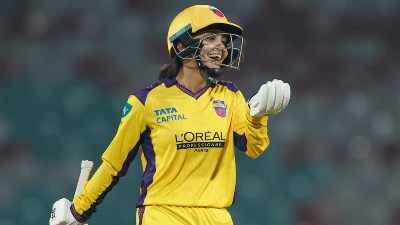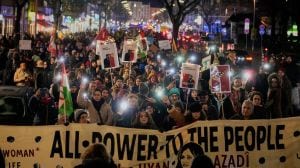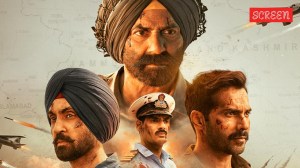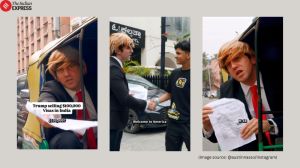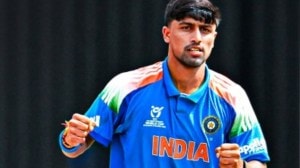A long wait for the BJP
Pride is central to nationalism. Therefore, when a nationalist party like the Bharatiya Janata Party comes to power, it becomes a nationa...

Pride is central to nationalism. Therefore, when a nationalist party like the Bharatiya Janata Party comes to power, it becomes a national obsession. After all, it was this party which exhorted the people to proclaim, Garv se kaho hum Bharatiya hain Say it with pride that we are Indians, which is a slight variation on the Vishwa Hindu Parishad8217;s garv se kaho hum Hindu hain. Even today the party never tires of raising this slogan from every available platform. The purpose of such indoctrinated pride is however incomprehensible except as an attempt to perpetuate falsehood.
Pride is a natural phenomenon. But what the BJP seeks to instill in the people is a false sense of pride. An instance of this kind was the almost hysterical reaction of VHP leader Ashok Singhal to the reports of Lord Ganesh devouring milk that it marked the advent of the Hindu millennium. When subsequent reports conclusively proved that the phenomenon was nothing but capillary action at play, the millennium balloon waspricked.
The latest instance of a concerted attempt to drum up national pride was in the context of the nuclear blasts at Pokharan in May. A common refrain of the BJP leaders was the pride Indians all over the world felt over the country8217;s achievement. They were so bitten by the pride bug that the Prime Minister did not think twice before visiting the blast site and flashing the victory sign in the company of the scientists who had masterminded the tests. It did not occur to them that in the past neither the Chinese nor the French had discovered photo ops at their blast sites. Even Indira Gandhi, who allowed herself to be photographed at Pokharan immediately after the first blast in the seventies, did not raise her fingers. But the BJP8217;s grand project to inculcate pride suffered a setback when 16 days later Pakistan also followed in India8217;s nuclear footsteps. And not to lag behind his Indian counterpart, Nawaz Sharif too visited the Chagai hills to photographically record the event. It was perhaps a matterof subcontinental pride that, despite being among the poorest countries in the world, India and Pakistan could spare precious resources to build bombs and acquire capability to destroy each other! The calculations that India8217;s stock in the comity of nations would automatically go up were proved wrong but this has not dampened the spirit of the leadership which is happy that the Indian tests were condemned only with restrained fury at the ARF meet in Manila.The BJP leaders give strange arguments to buttress their point that Indians have every reason to be proud. One of them, a top BJP leader who holds an important ministerial assignment, boasts that no other country in the world is civilizationally stronger than India. However, it is when he goes into the specifics that he alarms the listener. Who says India is a nation of illiterates, he asks. It is more literate than the US. His logic: Assuming that 40 per cent of Indians are literate, it means the population of literate Indians is much more than the totalpopulation of the superpower.About poverty too, Indians need not be ashamed, the same minister maintains. Indians are definitely richer than the Americans. If 40 or 50 per cent of Americans are rich, so are at least 20 per cent of Indians. In absolute terms, there are, therefore, more rich people in India than in the US. The Americans may have their supersonic jet fighters but our scriptures refer to deadlier weapons than what they claim. Think of it, our rishis had access to aeroplanes centuries before the Wright brothers were born.
Had it been propounded by a lesser mortal, it could have been dismissed as a delusion of grandeur but when it comes from someone who is in a position of authority and who is bent upon moulding the minds of the impressionable, it causes concern. In contrast, was this shopkeeper in Munich. When asked why one of the hair-dryers he showed me was costlier than the other despite the specifications being the same, pointed to the label on one of them which simply said, Made inGermany8217;.
When he did this, he was oozing national pride without being conscious of it. Does our Made in India8217; label inspire such confidence? In fact, when on Sunday Prime Minister A.B. Vajpayee offered 10,000 litres of edible oil to Namibia as a gift, a wag wondered whether the African country would be reckless enough to accept it after reports of contaminated edible oil causing dropsy and killing dozens of people in the Indian Capital. Here labels do not matter. Some of the mustard oil brands had sported the prestigious Agmark symbol but this did not make them any safer to the consumer. Nor did the fact that one of the brands had come from the stables of a cooperative giant, which started by selling milk but found it more profitable to sell mineral water. Imagine the milkman sellingwater too!
The British-born pioneering scientist, Dr Hassall, after some painstaking research, concluded that most of the edible items manufactured in Britain in the 1840s were adulterated. Were such a study to be made inIndia as it prepares to enter the 21st century, it would find the level of adulteration no lower than in Victorian England.
India8217;s pride suffers a knock each time such a calamity strikes the nation. We take pride that India manufactures everything from pins to aeroplanes and satellites but why is it that our exports are still confined to traditional items like tea, clothes and iron ore? A striking contrast is provided by China, which one of our ministers described as this country8217;s potential enemy No. 1, flooding the US and south-east Asian markets with affordable products.
But in India shubh laabh is the single most important motivating factor for industry and trade. Everything is acceptable as long as it ensures profit. Those industrialists who raked in enormous profits during the days of the licence raj, when journalists took pride in getting out-of-turn allotment of scooters because of their proximity to the politicians in power, are today advocates of swadeshi and wonder why they donot find a place in the Prime Minister8217;s economic advisory councils. They abhor competition and that is why they and their ilk instigate students8217; unions to break Pepsi bottles and throw stones at Kentucky Fried Chicken outlets, even when Indian food is becoming increasingly popular in the West. This is pettiness and does not make India or Indians proud. Nor is there a short-cut to pride. It is achieved only when the people believe that India is a good place to live in. Not when they think that it is the ideal country to leave.
- 01
- 02
- 03
- 04
- 05


